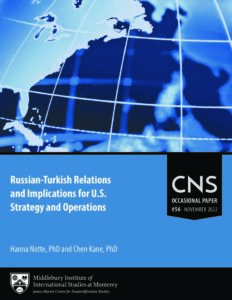November 14, 2022
Hanna Notte and Chen Kane
INTRODUCTION
Russia and Turkey’s complex relationship has significant implications for U.S. and North Atlantic Treaty Organization (NATO) strategic interests. The two states cooperate, deconflict, and compete in multiple theatres within Turkey’s extended neighborhood, which straddles United States Africa Command (USAFRICOM), United States Central Command (USCENTCOM), and United States European Command (USEUCOM) areas of responsibility (AORs). 1 Their bilateral strategic trade has created mutual dependencies and vulnerabilities across multiple sectors, such as natural gas, nuclear energy, and tourism.
Russia’s invasion of Ukraine in February 2022 has many implications for the Russia-Turkey relationship. While engaging actively with Russia and stoking fears that its commercial ties with Moscow could serve Russia’s evasion of Western sanctions, Turkey has also provided TB2 Bayraktar drones to Ukraine, invoked the Montreux Convention, and offered itself as a mediator on various operational issues in the Russia-Ukraine war. As a result of these steps, Turkey’s leverage over both Russia and NATO allies has increased since February 2022. From a U.S. perspective, the implications have been mixed as Turkey has translated its increased leverage into foreign policy steps that threaten to undermine U.S. interests and NATO cohesion.
Turkey remains of significant importance to the United States in enabling its interests in the three aforementioned AORs, preventing third actors like China and Iran from operating in the “seams,” and generating an enhanced, unified, and credible NATO capability and capacity in response to Russian aggression. It follows that Turkey’s interplay with Russia in its extended neighborhood has far-reaching implications for the United States and NATO. This study aims to shed light on this relationship, its likely trajectory over the coming decade, its implications for U.S. strategic interests, and how the United States and NATO might shape the Russia- Turkey interplay to their advantage.

